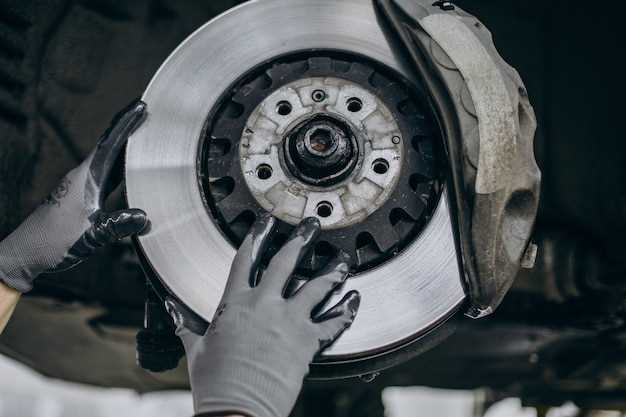
Choosing the right brake pads for your truck is essential for maintaining optimal performance and safety, especially when it comes to heavy-duty applications. The right pads can significantly affect your vehicle’s braking efficiency, longevity, and overall driving experience. With a wide range of options available on the market, it’s crucial to understand the factors that contribute to the best choice for your specific needs.
When evaluating brake pads, consider the material composition as it directly impacts their performance. Heavy-duty brake pads often utilize advanced materials like ceramic or semi-metallic compounds, which provide superior stopping power and durability under high-stress conditions. Durability is particularly important for trucks that frequently haul heavy loads or operate in demanding environments.
Additionally, it’s essential to assess compatibility with your truck’s make and model, as different vehicles may require specific types of pads. Consult your owner’s manual or speak to a professional to ensure you select pads that meet the manufacturer’s recommendations. Choosing the right brake pads not only enhances braking performance but also contributes to the overall safety of your truck and its occupants.
Understanding Material Types for Heavy-Duty Brake Pads

Choosing the right material for heavy-duty brake pads is crucial for ensuring optimal performance and safety. Heavy-duty brake pads are designed to withstand the intense demands of larger vehicles, making the material composition a key factor in their effectiveness.
There are several types of materials used in heavy-duty brake pads, each with its unique benefits:
1. Organic Materials: Organic brake pads contain natural fibers, such as rubber, resin, and other materials. They offer good initial stopping power and are generally quieter during operation. However, they may wear out more quickly under heavy loads and high temperatures, making them less suitable for extreme conditions.
2. Semi-Metallic Materials: Semi-metallic pads contain a mixture of metal shavings, such as copper, steel, or iron, along with organic materials. They provide excellent heat dissipation and durability, making them ideal for heavy-duty applications. These pads are known for their strong performance under high-stress conditions, but they can be noisier and may wear down rotors more quickly.
3. Ceramic Materials: Ceramic brake pads are made from a combination of ceramic fibers, bonding agents, and filler materials. They offer low dust production, quieter operation, and prolonged lifespan, making them a popular choice for heavy-duty trucks. However, their performance may decrease under extreme heat conditions, which can be a concern for heavy-load operations.
4. Carbon-Composite Materials: Carbon-composite brake pads are designed for high-performance applications, utilizing a blend of carbon fibers and other materials. They offer remarkable heat resistance and consistent stopping power, making them suitable for heavy-duty vehicles that operate under intense conditions. However, they tend to be more expensive than other types of pads.
In summary, when selecting heavy-duty brake pads, understanding the various material options is essential. Each material type has distinct characteristics and advantages that can affect performance, longevity, and overall safety. Evaluate your truck’s specific requirements and typical operating conditions to choose the best brake pads that meet those needs.
Evaluating Compatibility with Your Truck Model
When selecting brake pads for your truck, assessing compatibility with your specific model is crucial to ensure optimal performance and safety. Each truck model may have unique demands based on factors such as weight, braking system design, and intended use. To start, consult your vehicle’s owner’s manual, which typically includes specifications for recommended brake components, including heavy-duty options.
Brake system configuration can vary significantly between models, including differences in caliper types, rotor sizes, and brake pad shapes. It’s essential to identify whether your truck has a standard braking system or a more robust, heavy-duty setup designed for increased load capacity. Heavy-duty brake pads often feature advanced materials and design features to withstand higher temperatures and provide better stopping power under stress.
Next, cross-reference parts with the manufacturer’s specifications. Many manufacturers provide part numbers for compatible brake pads, which help ensure that you select pads engineered for your specific truck’s needs. Utilizing these part numbers can save you from unnecessary returns and potential safety risks associated with mismatched components.
Additionally, consider the performance requirements based on your truck’s usage. If you utilize your vehicle for towing or transporting heavy loads, opting for high-performance heavy-duty brake pads will improve stopping efficiency and durability. On the other hand, for standard use, regular-grade pads may suffice, though investing in premium options can still enhance your truck’s braking system longevity.
Lastly, check for customer reviews and expert recommendations regarding brake pads compatible with your truck model. Insights from other users can highlight real-world performance, reliability, and issues that may not be apparent through specifications alone. Ensuring you choose the right brake pads tailored to your truck’s unique characteristics will ultimately enhance safety and driving experience.
Assessing Performance Ratings and User Reviews

When selecting brake pads for your truck, one of the most crucial steps is assessing performance ratings and user reviews. Heavy-duty trucks endure significant strain, and choosing the right brake pads can significantly impact safety and performance. Begin by researching performance ratings, which are often based on criteria such as stopping distance, heat resistance, and wear longevity.
Look for products that have been rigorously tested under conditions similar to those your truck frequently encounters. Check for independent testing results from organizations that specialize in automotive assessments. These assessments can provide insights into how the brake pads perform in real-world situations compared to competitors.
User reviews are another vital resource. They offer firsthand accounts from truck owners who have installed and used specific brake pads. Pay attention to comments regarding the brake pads’ performance under heavy loads, durability over time, and any issues related to noise or dust production. Comparative analyses can also be beneficial; seeing how different brands stack up against one another provides valuable context.
It’s essential not to rely solely on the aggregate rating but to read individual reviews for context. Different vehicles and driving styles can influence performance, and understanding the experiences of others can guide your decision toward a product that aligns with your truck’s demands.
In summary, a thorough examination of performance ratings and user reviews will empower you to select heavy-duty brake pads that offer the reliability and efficiency needed for your truck. This approach not only enhances safety but also contributes to the longevity and overall performance of your braking system.




